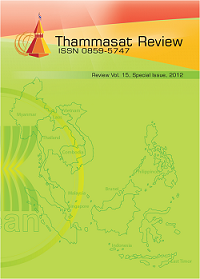Confessing to the Politicization of the ASEAN Human Rights Agenda: A Case for the Modification of the Consensus Rule
Abstract
This paper explores proposals for a political decision-making procedure to supplement the strict application of the ASEAN decision-making modality, the Consensus Rule, to the human rights agenda. The Consensus Rule, simply stated, does not require unanimity; rather it requires the absence of open objections from any member state before a proposal can be collectively applied.
This paper first reorganizes the pragmatic decision-making modality of ASEAN in liberal theory, which emphasizes the requisites of (1) parity between and individuality of diverse political participants; and (2) the adherence to the existence of a rational consensus obtainable through deliberations. It then mobilizes the theory of Agonistic Pluralism to explain a lack of correspondence between the circumstances of the human rights debate and the ASEAN's decision-making modality. Briefly, Agonistic Pluralism posits the ineradicability of conflict and the impossibility of obtaining a rational consensus. By using the lenses of Agonistic Pluralism, this paper conceives the ASEAN human rights debate as a hegemonic/counter-hegemonic mobilization, which exposes a 'vertical dimension' in the negotiation landscape of the regional human rights agenda. Competing discourses are not simply arranged in a diverse horizontal splay; they are organized hierarchically, establishing inequality.
A re-examination of the ASEAN Charter negotiations, the first violent collision of differing human rights discourses, and subsequent negotiations of human rights, reveals the absence of both parity and a rational, fair and sensible consensus, despite the rigid adherence to consensus decision-making. This paper argues that ASEAN diplomatic conduct, anchored on the parity of member-states engaged in consensusseeking, belies the persistent dominance of a conservative status quo discourse of noninterference in domestic human rights affairs. More importantly, it argues that' consensus' obtained under these circumstances of hegemony is likely to be confounded, with agreements that are unfairly skewed in favor of the dominant discourse, despite any rhetoric on collegiality, mutuality and consensus.
This paper, thus, establishes an important impetus for ASEAN to finally
undertake a serious departure from the strict application of the Consensus Rule on
human rights issues. In order to avoid confounded outcomes that plague the consensusbased
decision-making modality, this paper proposes that ASEAN should preserve a
carefully measured level of already-existent politicization, rather than wholly attempt to
depoliticize the negotiation of the human rights agenda. ASEAN should first acknowledge the possibility of unresolvable human rights issues to which no rational consensus exists. Thereafter, it must recognize the instances when this possibility is manifest in consensus-based negotiations. Thereafter, ASEAN should resolve such issues through a political decision-making procedure, such as a voting process, that mobilizes precisely the inherent politicization of ASEAN over human rights.
Keywords: Asean, Consensus, Hegemony, Voting Procedures, Agonistic Pluralism
Downloads
How to Cite
Issue
Section
License
The opinions and ideas expressed in all submissions published in Thammasat Review are solely that of the author(s) and do not necessarily reflect that of the editors or the editorial board.
The copyright of all articles including all written content and illustrations belong to Thammasat Review. Any individuals or organisation wishing to publish, reproduce and distribute a particular manuscript must seek permission from the journal first.








